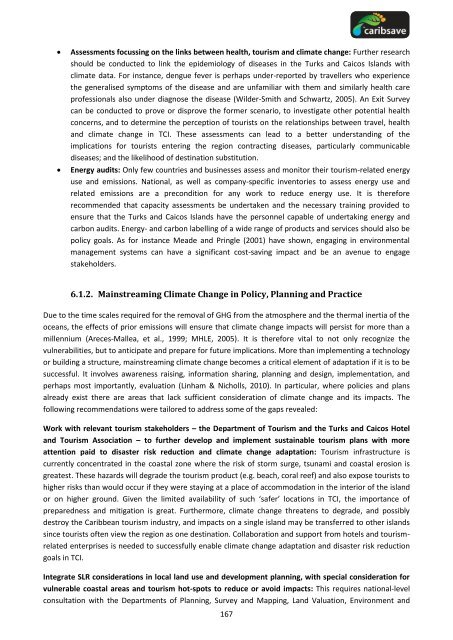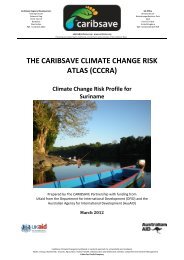You also want an ePaper? Increase the reach of your titles
YUMPU automatically turns print PDFs into web optimized ePapers that Google loves.
Assessments focussing on the links between health, tourism <strong>and</strong> climate change: Further research<br />
should be conducted to link the epidemiology of diseases in the <strong>Turks</strong> <strong>and</strong> <strong>Caicos</strong> Isl<strong>and</strong>s with<br />
climate data. For instance, dengue fever is perhaps under-reported by travellers who experience<br />
the generalised symptoms of the disease <strong>and</strong> are unfamiliar with them <strong>and</strong> similarly health care<br />
professionals also under diagnose the disease (Wilder-Smith <strong>and</strong> Schwartz, 2005). An Exit Survey<br />
can be conducted to prove or disprove the former scenario, to investigate other potential health<br />
concerns, <strong>and</strong> to determine the perception of tourists on the relationships between travel, health<br />
<strong>and</strong> climate change in TCI. These assessments can lead to a better underst<strong>and</strong>ing of the<br />
implications for tourists entering the region contracting diseases, particularly communicable<br />
diseases; <strong>and</strong> the likelihood of destination substitution.<br />
Energy audits: Only few countries <strong>and</strong> businesses assess <strong>and</strong> monitor their tourism-related energy<br />
use <strong>and</strong> emissions. National, as well as company-specific inventories to assess energy use <strong>and</strong><br />
related emissions are a precondition for any work to reduce energy use. It is therefore<br />
recommended that capacity assessments be undertaken <strong>and</strong> the necessary training provided to<br />
ensure that the <strong>Turks</strong> <strong>and</strong> <strong>Caicos</strong> Isl<strong>and</strong>s have the personnel capable of undertaking energy <strong>and</strong><br />
carbon audits. Energy- <strong>and</strong> carbon labelling of a wide range of products <strong>and</strong> services should also be<br />
policy goals. As for instance Meade <strong>and</strong> Pringle (2001) have shown, engaging in environmental<br />
management systems can have a significant cost-saving impact <strong>and</strong> be an avenue to engage<br />
stakeholders.<br />
6.1.2. Mainstreaming Climate Change in Policy, Planning <strong>and</strong> Practice<br />
Due to the time scales required for the removal of GHG from the atmosphere <strong>and</strong> the thermal inertia of the<br />
oceans, the effects of prior emissions will ensure that climate change impacts will persist for more than a<br />
millennium (Areces-Mallea, et al., 1999; MHLE, 2005). It is therefore vital to not only recognize the<br />
vulnerabilities, but to anticipate <strong>and</strong> prepare for future implications. More than implementing a technology<br />
or building a structure, mainstreaming climate change becomes a critical element of adaptation if it is to be<br />
successful. It involves awareness raising, information sharing, planning <strong>and</strong> design, implementation, <strong>and</strong><br />
perhaps most importantly, evaluation (Linham & Nicholls, 2010). In particular, where policies <strong>and</strong> plans<br />
already exist there are areas that lack sufficient consideration of climate change <strong>and</strong> its impacts. The<br />
following recommendations were tailored to address some of the gaps revealed:<br />
Work with relevant tourism stakeholders – the Department of Tourism <strong>and</strong> the <strong>Turks</strong> <strong>and</strong> <strong>Caicos</strong> Hotel<br />
<strong>and</strong> Tourism Association – to further develop <strong>and</strong> implement sustainable tourism plans with more<br />
attention paid to disaster risk reduction <strong>and</strong> climate change adaptation: Tourism infrastructure is<br />
currently concentrated in the coastal zone where the risk of storm surge, tsunami <strong>and</strong> coastal erosion is<br />
greatest. These hazards will degrade the tourism product (e.g. beach, coral reef) <strong>and</strong> also expose tourists to<br />
higher risks than would occur if they were staying at a place of accommodation in the interior of the isl<strong>and</strong><br />
or on higher ground. Given the limited availability of such ‘safer’ locations in TCI, the importance of<br />
preparedness <strong>and</strong> mitigation is great. Furthermore, climate change threatens to degrade, <strong>and</strong> possibly<br />
destroy the Caribbean tourism industry, <strong>and</strong> impacts on a single isl<strong>and</strong> may be transferred to other isl<strong>and</strong>s<br />
since tourists often view the region as one destination. Collaboration <strong>and</strong> support from hotels <strong>and</strong> tourismrelated<br />
enterprises is needed to successfully enable climate change adaptation <strong>and</strong> disaster risk reduction<br />
goals in TCI.<br />
Integrate SLR considerations in local l<strong>and</strong> use <strong>and</strong> development planning, with special consideration for<br />
vulnerable coastal areas <strong>and</strong> tourism hot-spots to reduce or avoid impacts: This requires national-level<br />
consultation with the Departments of Planning, Survey <strong>and</strong> Mapping, L<strong>and</strong> Valuation, Environment <strong>and</strong><br />
167





